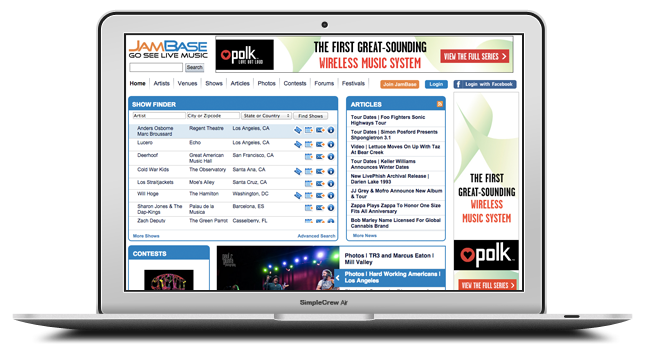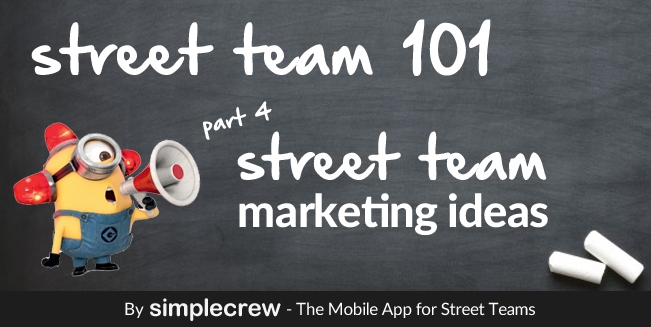This is the fourth post in the “Street Team 101” series
1. How To Recruit a Street Team.
2. How To Prepare a Street Team.
3. How to Incentivize and Motivate your Street Team.
4. Street Team Marketing Ideas. <= You are here!
5. Street Team Communication.
Bonus: 3 Awesome Apps for Street Team Communication.
Bonus: 6 Street Team Software Applications To Help You Manage Your Street Team.
So now you’ve got a street team (which you’re recruiting continuously), you’ve onboarded them smoothly with a welcome pack and street team orientation meeting, and your team knows exactly what’s in it for them.
You’re ready to roll, let’s put your street team to work.
These days, the work street teams do is divided between two camps: online and offline marketing.
The distinction is simple enough, with online affecting your digital presence on social networks, message boards, and calendar sites, and offline efforts generating awareness for you via printed marketing materials in the real world.

Online Street Team Marketing Ideas
The proliferation of social networks have made online marketing a breeze. Since Facebook is usually the first place promoters have their street teams get the word out about their events, we’ll start there before winding through online concert calendars, message boards, and then on to other offline marketing techniques.
Facebook doesn’t need much introduction or explanation. It’s The Book, you already know how to work it. Just to be sure though, here’s a couple bullet point ideas for how to promote a concert on Facebook:
- Create Facebook events and have your team invite all their Friends. (Protip: use our free Facebook Invite All browser extension)
- Have team members share recent press or SoundCloud/YouTube links for artists upcoming in the calendar
- Share the event fliers on Facebook and tag your team members
- Ask your team members to change their profile pictures or cover photos to the event flier (more intrusive, so don’t push them if they don’t want too.)
Calendars
Concert calendar sites like JamBase and SongKick have become a standard way for many people to find upcoming concerts in their area. They allow you to search for shows in your area, and let you filter by date or genre and create personalized calendars of your favorite upcoming shows.

The relevance of these sites varies from genre to genre and region to region, but in our experience, enough people were going to these sites that it was important for us to maintain and manage our presence on them.
For us this meant making sure all of our events were listed and the event information was correct, then asking our team members to join the events as “Attending” to increase their relevance.
The Make-Your-Own-Calendar Trick
Another calendar-related method we used to use back when we promoted concerts around DC – we had an open group for DC/Baltimore area jam and electronic shows. Then every week we’d keep it updated with the latest show announcements, and clear out the old shows that went passed. For a couple hundred students at University of Maryland, the group became a go-to – a curated list of shows that they knew they’d be interested in.
Then, we made a special section underneath the general local listings for just our shows. It was a perfect way to create some value for local concertgoers while also bringing more awareness to our shows unintrusively.
Feel free to steal this idea – have your team members manage a local concerts calendar group on FB (or message boards), and include all the local concerts relevant to a particular genre. Place a section below for your shows, and you’ve got a great channel for promotion.
Message Board Sites
Every niche has their own. In my world it was site like Phantasy Tour for Phish and the Disco Biscuits fans, the Low Down for STS9 fans, and The Bort for Umphrey’s McGee fans.
Do a search or ask around for what message boards your target fans congregate around, as your mileage will vary for different niches, genres, and artists.
Once you find your target message boards – the trick here again is to not be too intrusive. For communities like these, there’s nothing worse than promoter trolls dropping in and leaving a sales-y promo post – and for you, there are few things less effective.
In my experience with message board sites, our approach was usually a combination of two things:
First – we’d run the weekly “concert calendar thread”, which, like their Facebook counterparts, would aim to bring attention to all the interesting local concerts. This usually turned into a pretty active thread with members chiming in about which ones were coming up.
Second – with message boards that allow user signatures, titles, and customer avatars or signature graphics – we’d have our team put some updates in there. Don’t go overboard with the message intensity by overhauling your entire profile to promote the gig – just a line or two in the signatures of an active message board member or two usually suffices.
For our biggest events like festivals and special events, we’d create individual threads hyping it up and getting a discussion going around the solo event, though that was something we’d typically hold back from for individual club shows.

Offline Street Team Marketing Ideas
With the amount of noise on online channels these days, it’s becoming more and more challenging to stand out from the crowd. Would-be concertgoers sometimes face information overload, and end up tuning out the Facebook event invites and promotional emails.
That’s where your offline presence comes in. With offline, you offer your audience a much more tangible and “real” presence.
“Active” marketing tactics like hand-to-hand flyers and sampling come with the added benefit of personal interaction and community engagement. For our promotions, we used to take our list of relevant upcoming shows in the region and hook up 2 team members per show with guest list spots and a couple hundred fliers each. After the show, we would usually ask them to skip the encore and post up outside the exit to hand out fliers.

If you think about it – there’s pretty much no better way to target local concertgoers in any given genre. By targeting people leaving a show related to ours in our region, we were getting lot of bang for a buck with the fliers we were putting out.
Pro-tip for post-show flying: teach your team to make eye contact and have something to say while they’re promoting. The passive stand-their-quietly-and-try-to-be-ignored loses half the value of being there. Have them make their presence known. The message will come through stronger, and they’ll have more fun.
The other half of offline marketing is “passive” tactics:
- Flyers/posters at local shops, cafes, and restaurants
- Community bulletin boards/kiosks
- Chalking (for college campuses)
Pro-tip for passive street-team marketing: remember the marketing “rule of three” – for methods such as unmanned flyers and posters (or radio/tv/banner ads…) a general rule of thumb is that we need to see any given imagery and message 3 times before actually tuning in to it.

In terms of budgeting for printed marketing materials – we’ve heard huge ranges. For us, we would typically allocate $1,000-$1,500 per month on the monthly concert calendar posters and fliers, and then $200-300 per show on individual flyers for the medium sized shows. Special events and festivals would typically get around a $1,500 budget for printed marketing materials. We’d be interested in hearing more though, so if you have different budgets, leave them in the comments.
Fin
That’s pretty much it. Using Facebook, Concert Calendars, and Message Boards, your team will help you develop a strong online presence. And with passive street teaming tactics like flying, posturing, and chalking, you can increase your reach into the real world. Your event will be front and center in front of your fans, and everyone will have a great time.
Next week, we’ll cover communication with your team, and close it out the week after with thoughts on building a community. Until then, hasta luego!



